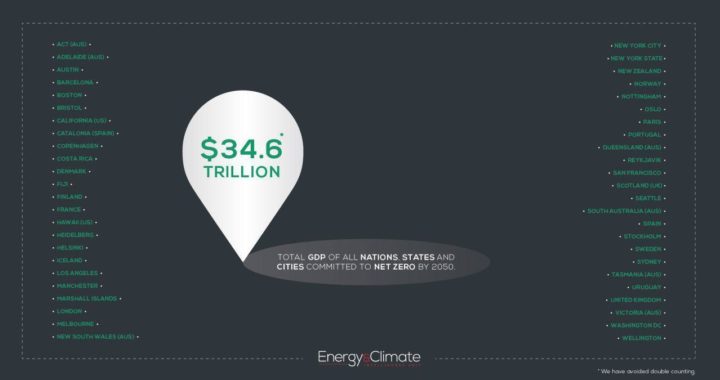Two-fifths of global GDP under actual or intended net zero emissions targets
Just a year after the IPCC made the case for a 2050 global net zero target, nations, regions and cities are getting the message
By Richard Black
info@eciu.netShare

About two-fifths of the world’s gross domestic product (GDP) is now generated in places where authorities have set or are proposing to set a target of bringing carbon emissions to net zero in or before 2050.
A new analysis by the Energy and Climate Intelligence Unit (ECIU), a London-based think-tank, shows that just over $34 trillion, about 40% of the world’s annual GDP, derives from nations, regions and cities with an actual or intended net zero target.* The data comes from ECIU’s Net Zero online tracker and is released as ministers and representatives from all nations meet in Madrid for the 2019 United Nations climate summit (COP25).
The list includes places with net zero targets at various levels of development: where the target is under active political discussion, where leaders have made a political declaration, where legislation is under development and where it has been enacted – and from two countries that are already carbon-negative.
Places with high annual GDP figures that have or intend to have a net zero target include:
- Germany ($3.7 trillion), where Chancellor Angela Merkel has pledged to make the country carbon-neutral by 2050
- California ($2.8 tn), where Governor Jerry Brown last year signed an executive order mandating carbon neutrality by 2045
- The UK ($2.6 tn), where Parliament passed legislation in June this year mandating net zero by 2050
- Tokyo ($1.9 tn), whose Metropolitan Government earlier this year declared it was targeting net zero in pursuance of the 1.5ºC Paris Agreement global warming target.**
ECIU Director Richard Black said: “The majority of these cities, regions and countries have neither a legally-binding commitment nor a mechanism to achieve their targets, so for the most part these are as yet only aspirations.
“Nevertheless, it’s startling that little more than a year after science showed the rationale for reaching global net zero by 2050, national and local governments covering two-fifths of the world’s GDP have said publicly that their locality should step up.”
In October 2018, the Intergovernmental Panel on Climate Change (IPCC), the UN organisation that collates and analyses climate science for governments, showed that in order to have a 50% chance of keeping global warming to the Paris Agreement target of 1.5ºC, global carbon emissions need to reach net zero by 2050.
The IPCC report also found that the target can be achieved; and a number of other reports from bodies such as the Energy Transitions Commission and the UK’s Royal Society and Royal Academy of Engineering have reached the same conclusion. However, few nations or regions have undertaken detailed analysis on how they will reach their net zero targets.
“The apparent appetite for carbon neutrality presents a tremendous opportunity for the UK, as host of next year’s pivotal UN climate summit, to lead a meaningful global effort on net zero,” said Richard Black.
“Merely touting its national target as showing ‘climate leadership’ won’t win ministers any plaudits in 2020.
“However, if the UK can work with a significant number of countries and regions to turn their net zero aspirations into concrete plans with means of delivery attached, including enhanced 2030 targets, using the Climate Change Act and net zero methodology as a basis, that will be a material step forwards to delivering a real outcome at the Glasgow climate summit.”
NOTES:
* The figures avoid double-counting (for example, counting GDP from both a city and the region containing that city)
** Full list available on request